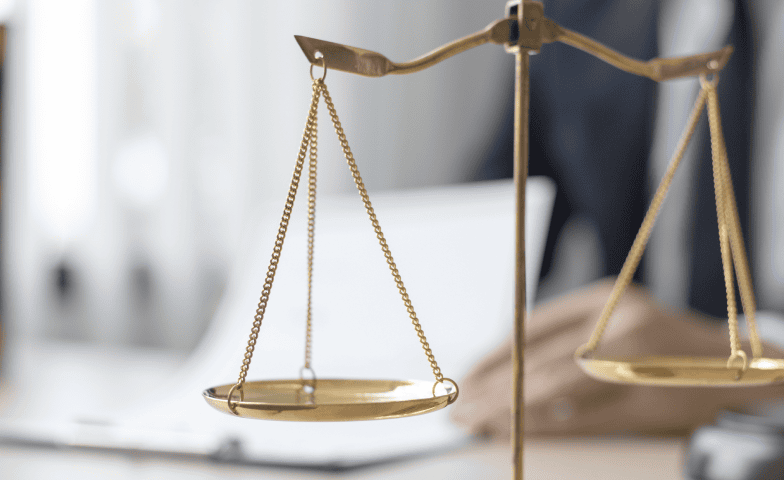
What Is Adverse Impact? How To Calculate and Mitigate
How can you reduce adverse impact? This article shows how to calculate adverse impact, and how to minimize the risks.
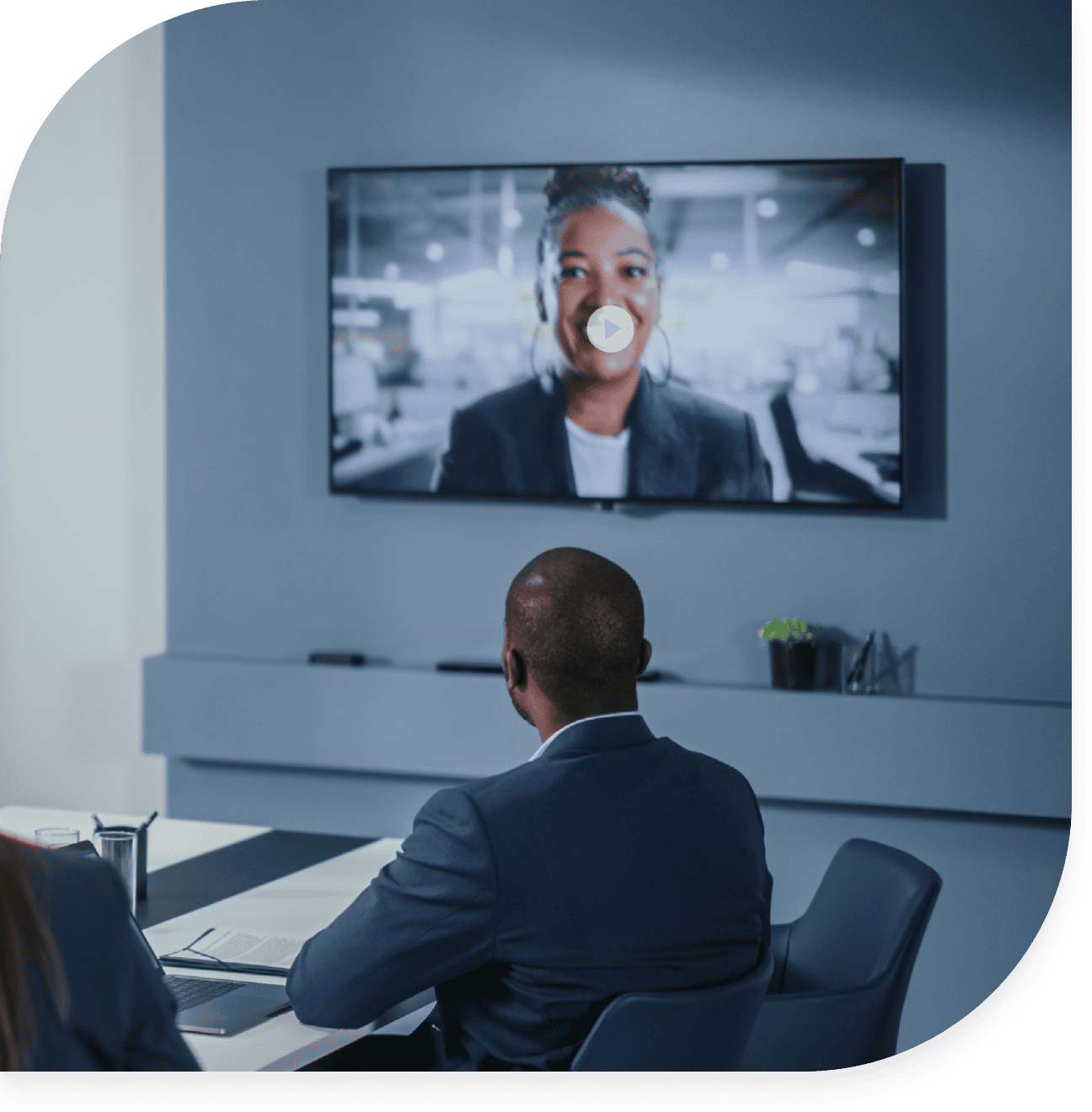
Pre-recorded video interviewing enables employers to deliver a structured interview process. Compared to phone screening and in-person interviewing, pre-recorded interviewing better mitigates discrimination and promotes accessibility. Learn how this interview format supports diversity-identified candidates.
Diversity, Equity, Inclusion, and Accessibility (DEI&A) hiring strategies require the right process and tools. Like any hiring tool, how you use it determines the level of impact your hiring has on diversity-identified groups (also known as protected groups). When properly used, pre-recorded interviewing, can significantly enhance the accessibility and inclusivity of the interview experience for protected groups.
Video interview software is ideal for diversity-focused hiring strategies because it enables the structured interview process. Combining a proven process with a modern tool like pre-recorded interviewing software helps reduce bias and discrimination in the candidate screening step.
How one employer is using pre-recorded interviewing to support workplace diversity
Leading organizations use video interview platforms because it allows them to offer more equitable processes. As one example, Global Affairs Canada is better at accommodating time constraints for people with disabilities and conducting anonymized recruitment to help prevent bias thanks to structured pre-recorded interviewing.
Structured pre-recorded video interview software is a fair and efficient way to increase diversity in your hiring process. Find out why.
Pre-recorded interviewing expands the applicant pool by removing geography, time, and resource barriers.
This interview format also increases accessibility by eliminating barriers that phone and in-person cannot easily address. In the planning phase, the accessibility accommodations can be anticipated to ensure proper contextual evaluation prior to starting the process.
For example, you should prepare in advance for neurodiversity given that an estimated 15-20% of the world’s population exhibits some form of neurodivergence (British Medical Bulletin). Make sure you know how to offer the following accessibility accommodations within the interview platform: granting multiple response attempts, allowing candidates to review their responses before submission, providing longer preparation time before answering, and asking specialized accessibility-vetted questions. Some or all of these accommodations ensure a more equitable experience than a traditional phone screen.
For physical accessibility accommodations, pre-recorded interview software can potentially integrate with accessibility technologies that candidates are already using (screen readers, text readers, head pointers…etc).
Some diversity-identified groups may have inhibitions to in-person screening. Having the flexibility to complete the interview where, when, and how the candidate wants can help make the process more comfortable for all candidates, especially those with accessibility needs. Using interview scheduling best practices can also create a more ideal interviewing process for protected groups.
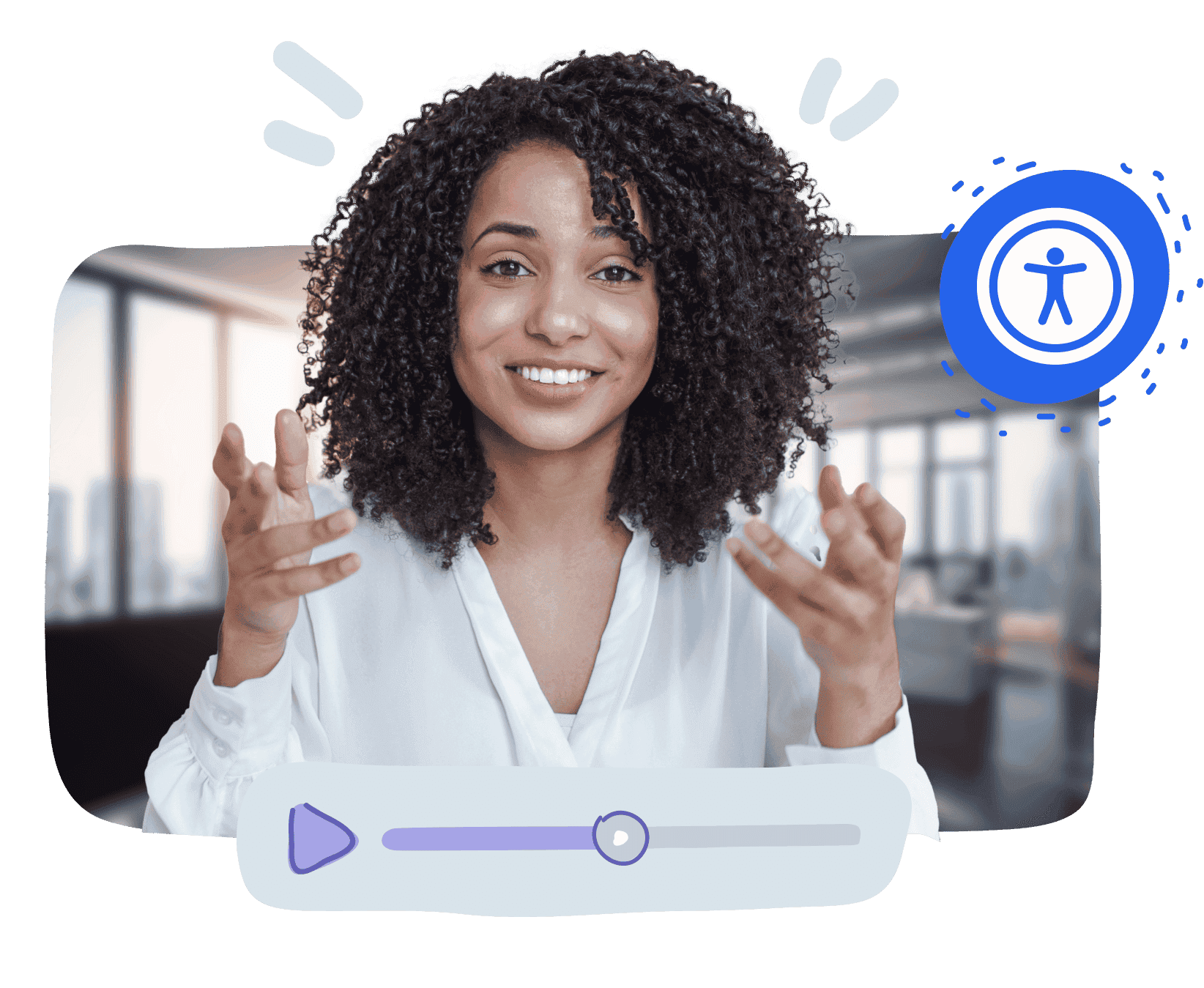
Supporting candidates with anxiety
Research by the European Journal of Work and Organisational Psychology showed that when candidates with anxiety use the additional preparation time you allocate to them, or take advantage of the option to record multiple attempts, it leads to better interview performance.
Help people succeed in pre-recorded interviews by encouraging all applicants to take advantage of these opportunities and assure them they won’t be rated any differently if they don’t.
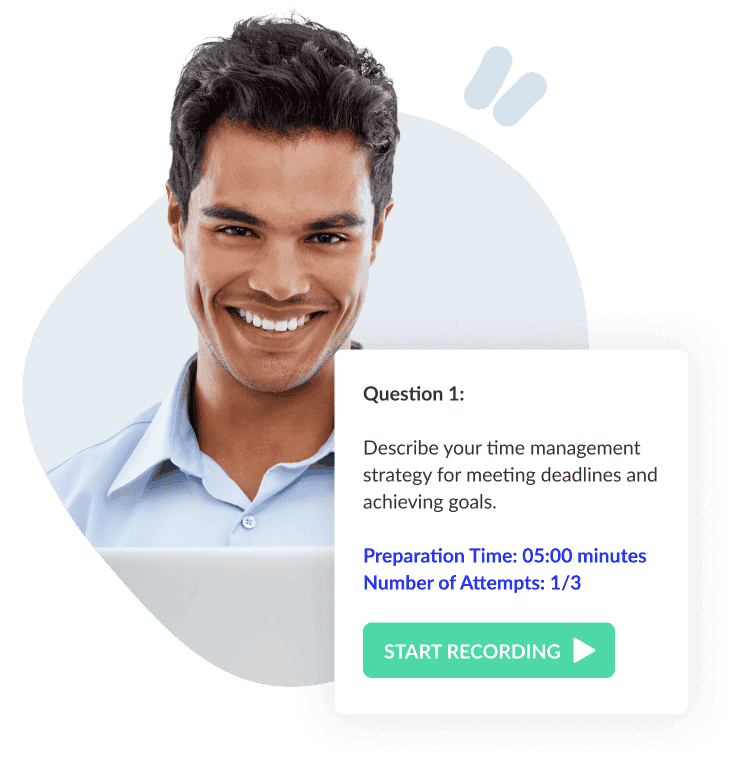
Structured interviews are generally accepted as one of the most powerful tools for creating an inclusive, non-discriminatory process. By keeping the questions competency-focused, these interviews mitigate some of the biases that adversely affect diversity-identified groups.
There is no interviewer in an asynchronous video interview so each question is asked identically unless specific accommodations are required for accessibility or cultural needs. Removing the recruiter from the interview equation makes the process more standardized than in-person or phone interviews ever could be.
Even if you give interviewers the best training and a script they are required to follow, in phone and in-person interviews the interviewer could still vary how they deliver the questions (inflection, volume, tone of voice, background noise, etc.). This may disproportionately affect protected groups. For example, neurodivergent candidates or candidates who may have accessibility-impacted challenges with auditory, cognitive, or cultural comprehension.
On using pre-recorded interviewing in graduate medical education admissions:
“I like the standardization of our question set in our rubric, that’s much better…you’re always at the whims of the individual running it if it’s synchronous. They can go off script, even if you give them a script.”
Dr. Ian Epstein,
Associate Professor, Past Internal Medicine Program Director, and Assistant Dean of Professional Affairs, Dalhousie Medical School
Regardless of the format, questions and their delivery to the candidate should be vetted for accessibility and cultural requirements by I/O psychologists. However, asynchronous interviews make it easy to deliver specialized questions or provide cultural or accessibility-designed content while still keeping the process structured.
If the candidate identifies a need for accommodation after the fact, specially-trained raters can rate the interview. This would not be possible if the candidate did a phone screen or in-person interview.

Pre-recorded video interviews can improve the quality of the evaluation process and the quality of the data you can capture during the interview. There are several reasons for this.
Structured rating training for evaluators enables smoother and more efficient multi-rater assessments. Phone and in-person screening interviews do not offer these opportunities.
Pre-recorded interviews are not limited by the rating capability of the person conducting the interview. The videos from each interview can be assessed from multiple perspectives and by raters with specific accessibility and culturally competent training and experience.
They also allow you to focus on rating competencies with precision. Evaluators can re-play candidate responses when needed to give candidates a better evaluation of their specific responses. Pre-recorded interviews mitigate multiple hiring biases, including hindsight bias, overconfidence bias, and more.
Embedded rating guides and mandatory rating fields ensure that ratings are completed at the time of the interview, reducing the risk of bias. These features also make it easier to train multiple raters to follow a consistent rating process than it would be to train one interviewer to conduct an identical interview process repeatedly.
It’s worth mentioning that when you compare in-person interviews with pre-recorded interviews, you may just be trading one set of biases for another. Instead of wondering if candidates can answer the questions and present well, you might instead be asking yourself if they can answer the questions and hold themselves well over video.
Since you can’t eliminate bias entirely, it’s about choosing interview types that enable you to prevent it. In terms of preserving interview quality and mitigating bias, pre-recorded video interviewing software is the best option for a few reasons.
Raters can revisit the ratings and multiple raters can evaluate the responses so it’s easier to incorporate diverse perspectives and make well-informed decisions. With pre-recorded interviews, you can also analyze how good of a job the rater is doing at following the rating guide and scoring fairly.
Synchronous phone and in-person interviews don’t allow you the luxury of reviewing interview responses because they are typically not recorded.
On replacing live interviews with pre-recorded interviewing in undergraduate medical education admissions:
“The asynchronous video interview platform delivers the interview content the same way we would if we had the interview here. In-person, we deliver it as a scenario on a door that the candidate would read and then walk in and then begin to answer the question…and what we saw was that the method of delivery did not impact our ability to evaluate the candidate.”
Joel Daboub,
Assistant Dean of Admissions and Assistant Professor, Dell Medical School
There are several reasons phone screens and in-person interviews don’t provide the same level of legal defensibility as structured pre-recorded video interviews. Video interview software documents the pre-recorded process, including capturing the rating data, the accommodation strategies and techniques used, and notes explaining the decision.
Suppose you ever did have to revisit a hiring decision because a candidate made an appeal. In that case, pre-recorded interviewing offers the opportunity to re-evaluate and provide evidence that your process is not discriminatory.
Capturing all interview data also creates a sense of accountability. When raters know their decisions can be scrutinized, it incentivizes them to be as accurate as possible in their ratings and notes.
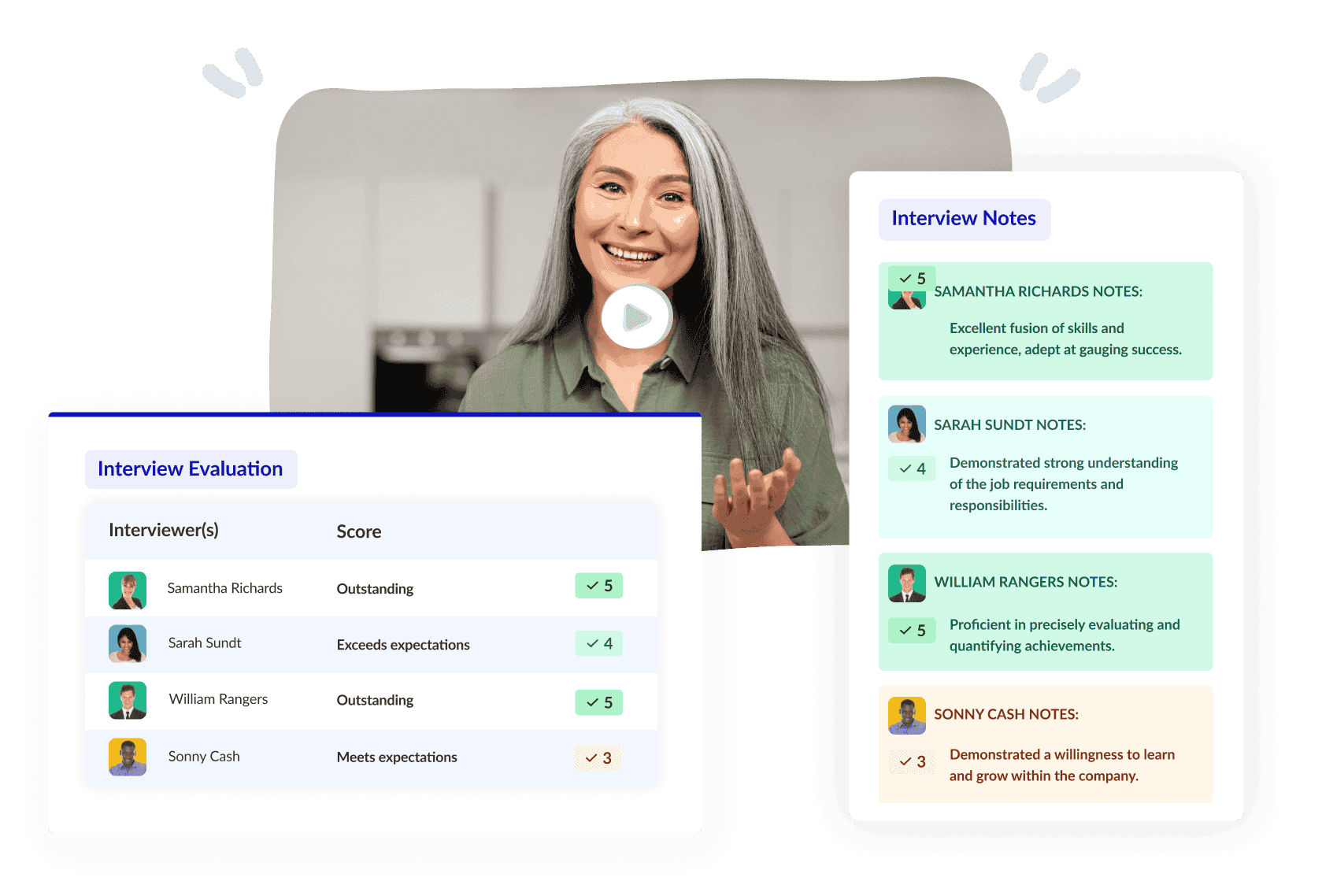
Updates to the Public Service Employment Act
“Before using an assessment method, the Commission shall conduct an evaluation to identify whether the assessment method and the manner in which it will be applied includes or creates biases or barriers that disadvantage persons belonging to any equity-seeking group and, if one is identified, make reasonable efforts to remove it or to mitigate its impact on those persons.”
— Public Service Employment Act, 2021, c. 23, s. 280, 36(2)
The amendment above requires that all interview methods get evaluated for biases and barriers before being used to avoid introducing discrimination into the interview process. Pre-recorded interviews make audits like this more straightforward because your data is captured and stored automatically in the interview software. Documentation doesn’t require any extra work outside of pulling reports.
Having a record of every interview also provides an opportunity to make adjustments during the interview if any barriers or bias arises. Pre-recorded interviewing allows you to switch out the rater or enable specific accessibility settings during the interview instead of forcing the candidate to interview again at a later date.
Takeaway: Pre-recorded interviews support legal defensibility and make interview compliance much easier.
Simply implementing pre-recorded video interviewing alone isn’t enough. It’s crucial to incorporate inclusion and accessibility strategies into the hiring process from the start. Think about pre-recorded interviewing as a tool that will drive workplace diversity.
Consider these best practices to help you achieve your recruiting goals and make your process more welcoming and accommodating.

Candidate Experience
Preparation
Expert Assistance
Provide all candidates with materials explaining why this interview format promotes a more inclusive, fair, and accessible process
Properly train raters in best practices and have a standby list of raters with expertise in potential accessibility rating and cultural competencies
Have DEI&A experts vet the hiring workflow to ensure diversity-identified groups have an equitable candidate experience
Do everything possible to reduce the potential for candidate anxiety
Offer and prepare for accessibility accommodations
Ensure all questions have been vetted by an I/O psychologist for accessibility and inclusion sensitivity
Allow for adequate preparation time and give candidates the ability to re-record answers
Avoid assessing for “cultural fit” as part of your selection criteria and instead consider “cultural add”
A study in The European Journal of Work and Organisational Psychology investigated the impact of two video interview design elements on interviewee attitudes, behaviors, and outcomes: preparation time (unlimited versus limited) and the ability to re-record responses.
It found that those who used more re-recording attempts performed better in the interview and engaged in less deceptive impression management. Moreover, those who used more preparation time performed better in the interview while engaging in slightly less honest impression management.
Takeaway: If you want to provide everyone equal opportunities, how you customize or design your pre-recorded video interview matters. Design elements can influence applicants’ fairness perceptions, anxiety, impression management (IM) tactics, and interview performance.
However, it’s worth noting that changing things like preparation time and re-tries do not guarantee that candidates will use the opportunities enabled to them by technology design.
A 2021 study by Ee Leng Goh at the University of London measured applicant perceptions of fairness and favorability toward pre-recorded video interviews and the impact on behavioral outcomes (intentions to recommend the company to others, intentions to withdraw their application and perceived procedure performance*).
Results showed that when applicants believe a technology-based interviewing selection process is procedurally fair and are more open towards it, the results showed positive applicants’ behavioral outcomes.
Takeaway: Embrace pre-recorded video interviews while keeping in mind that you have to establish a fair and favorable selection process because the opposite may lead to negative behavioral outcomes.
*Perceived procedure performance refers to applicants’ self-assessed perceptions of performance when using the screening tools.
Every candidate deserves a fair and consistent hiring process, and advancing hiring diversity starts with the screening process. With proper adherence to the process, pre-recorded video interviews provide specific advantages that improve accessibility and reduce bias far better than a phone or in-person screen ever could.
Overall, pre-recorded interviews are powerful tools that provide protected groups with an equitable opportunity to succeed and advance.
Pre-recorded interviews allow for a standardized set of questions to be asked to all candidates, which helps ensure that everyone is evaluated based on the same criteria. This transparency reduces the likelihood of bias or favoritism influencing hiring decisions, which leads to a more fair and consistent hiring process.
Yes, as pre-recorded interviews allow candidates to select the most convenient time slot for them to complete the interview. For example, candidates with hearing or visual impairments can adjust their environment to better access the interview. Applicants who experience job interview nerves may feel more comfortable answering questions in a stress-free, controlled environment.
While pre-recorded interviews provide many benefits, they do have some potential drawbacks. Candidates without access to a stable Internet connection or appropriate technology, for example, may face challenges completing their interview. Organizations should provide alternative options for candidates who may face technological barriers. A phone interview could be one of these options.
Modernize your hiring process with expert insights and advice.